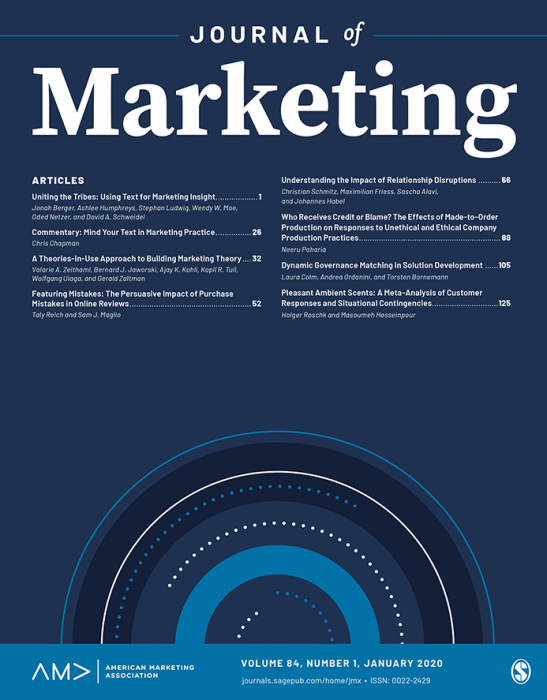EXPRESS: AI-Human Hybrids for Marketing Research: Leveraging LLMs as Collaborators
IF 10.4
1区 管理学
Q1 BUSINESS
引用次数: 0
Abstract
The authors’ central premise is that a human-LLM hybrid approach leads to efficiency and effectiveness gains in the marketing research process. In qualitative research, they show that LLMs can assist in both data generation and analysis; LLMs effectively create sample characteristics, generate synthetic respondents, and conduct and moderate in-depth interviews. The AI-human hybrid generates information-rich, coherent data that surpasses human-only data in depth and insightfulness and matches human performance in data analysis tasks of generating themes and summaries. Evidence from expert judges shows that humans and LLMs possess complementary skills; the human-LLM hybrid outperforms its human-only or LLM-only counterpart. For quantitative research, the LLM correctly picks the answer direction and valence, with the quality of synthetic data significantly improving through few-shot learning and retrieval-augmented generation. The authors demonstrate the value of the AI-human hybrid by collaborating with a Fortune 500 food company and replicating a 2019 qualitative and quantitative study using GPT-4. For their empirical investigation, the authors design the system architecture and prompts to create personas, ask questions, and obtain responses from synthetic respondents. They provide roadmaps for integrating LLMs into qualitative and quantitative marketing research and conclude that LLMs serve as valuable collaborators in the insight generation process.快讯用于市场研究的人工智能与人类混合体:利用法学硕士作为合作者
作者的核心前提是,人与 LLM 混合方法可提高营销研究过程的效率和效果。在定性研究中,他们表明 LLM 可以协助数据生成和分析;LLM 可以有效地创建样本特征、生成合成受访者,并进行和主持深度访谈。人工智能与人类的混合生成了信息丰富、连贯的数据,在深度和洞察力方面超过了纯人类数据,并在生成主题和摘要的数据分析任务中与人类表现不相上下。来自专家评委的证据表明,人类和 LLM 拥有互补的技能;人类-LLM 混合软件的表现优于纯人类或纯 LLM 软件。在定量研究方面,LLM 能正确选择答案的方向和价值,通过少量学习和检索增强生成,合成数据的质量显著提高。作者与一家财富 500 强食品公司合作,使用 GPT-4 复制了 2019 年的一项定性和定量研究,从而证明了人工智能与人类混合研究的价值。在实证调查中,作者设计了系统架构和提示,以创建角色、提出问题并获得合成受访者的回答。他们提供了将 LLM 整合到定性和定量营销研究中的路线图,并得出结论:LLM 是洞察力生成过程中的重要合作者。
本文章由计算机程序翻译,如有差异,请以英文原文为准。
求助全文
约1分钟内获得全文
求助全文
来源期刊

Journal of Marketing
BUSINESS-
CiteScore
24.10
自引率
5.40%
发文量
49
期刊介绍:
Founded in 1936,the Journal of Marketing (JM) serves as a premier outlet for substantive research in marketing. JM is dedicated to developing and disseminating knowledge about real-world marketing questions, catering to scholars, educators, managers, policy makers, consumers, and other global societal stakeholders. Over the years,JM has played a crucial role in shaping the content and boundaries of the marketing discipline.
 求助内容:
求助内容: 应助结果提醒方式:
应助结果提醒方式:


